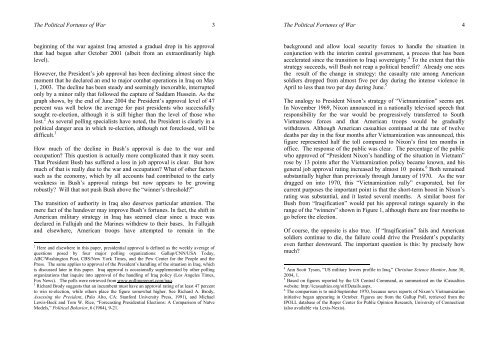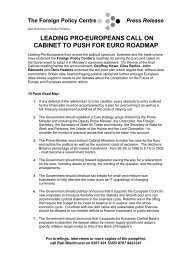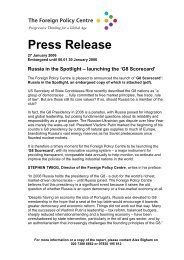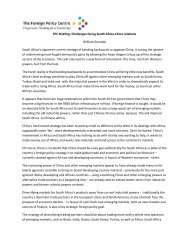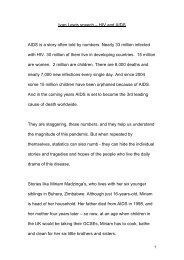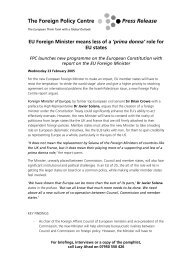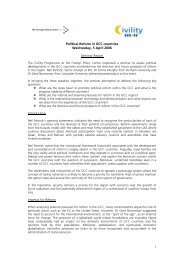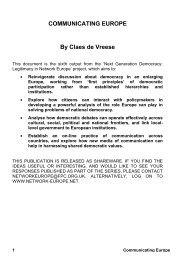The Political Fortunes of War - Foreign Policy Centre
The Political Fortunes of War - Foreign Policy Centre
The Political Fortunes of War - Foreign Policy Centre
Create successful ePaper yourself
Turn your PDF publications into a flip-book with our unique Google optimized e-Paper software.
<strong>The</strong> <strong>Political</strong> <strong>Fortunes</strong> <strong>of</strong> <strong>War</strong><br />
beginning <strong>of</strong> the war against Iraq arrested a gradual drop in his approval<br />
that had begun after October 2001 (albeit from an extraordinarily high<br />
level).<br />
However, the President’s job approval has been declining almost since the<br />
moment that he declared an end to major combat operations in Iraq on May<br />
1, 2003. <strong>The</strong> decline has been steady and seemingly inexorable, interrupted<br />
only by a minor rally that followed the capture <strong>of</strong> Saddam Hussein. As the<br />
graph shows, by the end <strong>of</strong> June 2004 the President’s approval level <strong>of</strong> 47<br />
percent was well below the average for past presidents who successfully<br />
sought re-election, although it is still higher than the level <strong>of</strong> those who<br />
lost. 2 As several polling specialists have noted, the President is clearly in a<br />
political danger area in which re-election, although not foreclosed, will be<br />
difficult. 3<br />
How much <strong>of</strong> the decline in Bush’s approval is due to the war and<br />
occupation? This question is actually more complicated than it may seem.<br />
That President Bush has suffered a loss in job approval is clear. But how<br />
much <strong>of</strong> that is really due to the war and occupation? What <strong>of</strong> other factors<br />
such as the economy, which by all accounts had contributed to the early<br />
weakness in Bush’s approval ratings but now appears to be growing<br />
robustly? Will that not push Bush above the “winner’s threshold?”<br />
<strong>The</strong> transition <strong>of</strong> authority in Iraq also deserves particular attention. <strong>The</strong><br />
mere fact <strong>of</strong> the handover may improve Bush’s fortunes. In fact, the shift in<br />
American military strategy in Iraq has seemed clear since a truce was<br />
declared in Fallujah and the Marines withdrew to their bases. In Fallujah<br />
and elsewhere, American troops have attempted to remain in the<br />
2 Here and elsewhere in this paper, presidential approval is defined as the weekly average <strong>of</strong><br />
questions posed by four major polling organizations: Gallup/CNN/USA Today,<br />
ABC/Washington Post, CBS/New York Times, and the Pew Center for the People and the<br />
Press. <strong>The</strong> same applies to approval <strong>of</strong> the President’s handling <strong>of</strong> the situation in Iraq, which<br />
is discussed later in this paper. Iraq approval is occasionally supplemented by other polling<br />
organizations that inquire into approval <strong>of</strong> the handling <strong>of</strong> Iraq policy (Los Angeles Times,<br />
Fox News). <strong>The</strong> polls were retrieved from www.pollingreport.com/iraq.<br />
3 Richard Brody suggests that an incumbent must have an approval rating <strong>of</strong> at least 47 percent<br />
to win re-election, while others place the figure somewhat higher. See Richard A. Brody,<br />
Assessing the President, (Palo Alto, CA: Stanford University Press, 1991), and Michael<br />
Lewis-Beck and Tom W. Rice, “Forecasting Presidential Elections: A Comparison <strong>of</strong> Naïve<br />
Models,” <strong>Political</strong> Behavior, 6 (1984), 9-21.<br />
3<br />
<strong>The</strong> <strong>Political</strong> <strong>Fortunes</strong> <strong>of</strong> <strong>War</strong><br />
background and allow local security forces to handle the situation in<br />
conjunction with the interim central government, a process that has been<br />
accelerated since the transition to Iraqi sovereignty. 4 To the extent that this<br />
strategy succeeds, will Bush not reap a political benefit? Already one sees<br />
the result <strong>of</strong> the change in strategy: the casualty rate among American<br />
soldiers dropped from almost five per day during the intense violence in<br />
April to less than two per day during June. 5<br />
<strong>The</strong> analogy to President Nixon’s strategy <strong>of</strong> “Vietnamization” seems apt.<br />
In November 1969, Nixon announced in a nationally televised speech that<br />
responsibility for the war would be progressively transferred to South<br />
Vietnamese forces and that American troops would be gradually<br />
withdrawn. Although American casualties continued at the rate <strong>of</strong> twelve<br />
deaths per day in the four months after Vietnamization was announced, this<br />
figure represented half the toll compared to Nixon’s first ten months in<br />
<strong>of</strong>fice. <strong>The</strong> response <strong>of</strong> the public was clear. <strong>The</strong> percentage <strong>of</strong> the public<br />
who approved <strong>of</strong> “President Nixon’s handling <strong>of</strong> the situation in Vietnam”<br />
rose by 13 points after the Vietnamization policy became known, and his<br />
general job approval rating increased by almost 10 points. 6 Both remained<br />
substantially higher than previously through January <strong>of</strong> 1970. As the war<br />
dragged on into 1970, this “Vietnamization rally” evaporated, but for<br />
current purposes the important point is that the short-term boost in Nixon’s<br />
rating was substantial, and it lasted several months. A similar boost for<br />
Bush from “Iraqification” would put his approval ratings squarely in the<br />
range <strong>of</strong> the “winners” shown in Figure 1, although there are four months to<br />
go before the election.<br />
Of course, the opposite is also true. If “Iraqification” fails and American<br />
soldiers continue to die, the failure could drive the President’s popularity<br />
even further downward. <strong>The</strong> important question is this: by precisely how<br />
much?<br />
4<br />
Ann Scott Tyson, “US military lowers pr<strong>of</strong>ile in Iraq,” Christian Science Monitor, June 30,<br />
2004, 1.<br />
5<br />
Based on figures reported by the US Central Command, as summarized on the iCasualties<br />
website: http://icasualties.org/oif/Details.aspx.<br />
6<br />
<strong>The</strong> comparison is to mid-September 1970, because news reports <strong>of</strong> Nixon’s Vietnamization<br />
initiative began appearing in October. Figures are from the Gallup Poll, retrieved from the<br />
IPOLL database <strong>of</strong> the Roper Center for Public Opinion Research, University <strong>of</strong> Connecticut<br />
(also available via Lexis-Nexis).<br />
4


